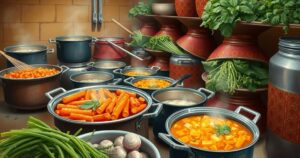Ramadan Eating Habits: Cultural Traditions Versus Modern Challenges in Morocco

Ramadan in Morocco significantly alters daily routines with cultural preparations for iftar and suhoor meals. Despite intentions for spiritual reflection, the month sees a rise of 40-50 percent in food consumption, leading to increased waste and health concerns amid economic challenges. Individuals like Maria struggle with societal pressures for extravagant meals, contrasting with emerging practices focusing on balanced eating. Experts advocate for moderation to promote both health and spirituality during this sacred period.
The month of Ramadan presents a unique period for Muslims globally, characterized by fasting until sunset, impacting daily routines significantly. In Morocco, this is evident as businesses and schools adjust their schedules, while households heavily prepare for the fast by stocking essential ingredients to create traditional meals, iftar and suhoor, which are key to family gatherings. However, there is a notable increase in food consumption during this time, with a reported 40 to 50 percent spike in food purchases, driven largely by impulse buying and lavish meal preparations.
Iftar gatherings in Morocco hold a significant cultural importance, often overflowing with a variety of elaborate dishes intended for family members breaking their fast after a long day. The traditional round tables symbolize communal dining, emphasizing sharing and celebration. Yet, this practice results in considerable food waste, with households discarding vast amounts of uneaten meals daily during Ramadan, reflecting a disconnect between the month’s spiritual goals and prevailing consumption habits.
In light of the current economic climate in Morocco, this culture of excess poses further challenges, particularly for lower-income families. The increased demand during Ramadan has led to soaring prices for fundamental groceries, making it increasingly difficult for some households to afford the necessities. The month, traditionally grounded in gratitude and moderation, now often finds individuals pressured to prepare extravagant meals, further straining budgets.
Maria, a 28-year-old housewife, expressed the burden she feels to create lavish iftar meals each night, sharing that much of the food ends up wasted. Her story resonates with many, highlighting how cultural expectations can complicate personal values. This cycle of excess is a widespread issue, with an average Moroccan wasting 91 kilograms of food yearly, and family members discarding between 60 and 500 dirhams worth of food during Ramadan.
In contrast, some individuals, such as Shaima Salmi, have taken a more moderate approach to iftar, opting for balanced meals that require less preparation. This shift indicates a growing awareness among the populace about nutrition versus excess. Sociology Professor Ahmed Drissi notes the evolution of Moroccan iftar traditions influenced by media and changing economic conditions, leading to stark contrasts in meal preparations today compared to previous years.
Health-related concerns also arise from the altered iftar practices. Dr. Faiçal Serrou, a general practitioner, reported a rise in digestive problems during Ramadan linked to overindulgence at iftar. He advises against the typical high-sugar and high-fat meals and encourages a more balanced approach to eating. Echoing this sentiment, nutritionist Mariam Khaldi warns that the focus on quantity may lead to long-term health risks, urging that proper portion control and hydration foster a healthier Ramadan experience.
In conclusion, the eating habits observed during Ramadan in Morocco illustrate a complex interaction between cultural traditions and modern challenges. The emphasis on elaborate iftar tables, while festive, has led to significant food waste and health concerns. Balancing tradition with responsible consumption is vital for enhancing the experience during this holy month, emphasizing a return to moderation and mindful eating. Recognizing the economic pressures further underscores the need for community awareness and adaptation to promote healthier lifestyles during Ramadan.
Original Source: www.moroccoworldnews.com







